The Falcon's Eyes
Summary (from the publisher): Set in France and England at the end of the twelfth century, the moving story of a spirited, questing young woman, Isabelle, who defies convention to forge a remarkable life, one profoundly influenced by the fabled queen she idolizes and comes to know—Eleanor of Aquitaine.A sweeping, suspenseful tale about marriage, freedom, identity, and motherhood, The Falcon’s Eyes not only illuminates a brilliant century and the notorious queen who dominated it, but also brings to life the vivid band of characters whom the heroine encounters on her journey to selfhood. Principal among them, Isabelle’s charismatic, controlling husband, as obsessed by falconry as he is by having an heir. The various settings—Château Ravinour, Fontevraud Abbey, and Queen Eleanor’s exiled court in England—are depicted as memorably as the noblewomen, nuns, servants, falconers, and courtiers who inhabit them. With a series of twists and turns, the story pulses forward as Isabelle confronts one challenge, one danger, after another, until it hurtles to its final, enthralling, page.
With the historical understanding of Hillary Mantel and the storytelling gifts of Ken Follett, Francesca Stanfill has created an unforgettable character who, while firmly rooted in her era, is also a woman for all times.
Review: I received an uncorrected proof copy of this novel from HarperCollins in exchange for an honest review.
Set in France in the twelfth century, Isabelle is a young woman from a well to do but impoverished family. Her family makes a good match for her with a wealthy but controlling husband. With time, Isabelle continues to see more of the dark parts of her husband's personality and feels increasingly trapped in her circumstances.
While billed as a novel about Eleanor of Aquitaine, the queen doesn't appear in the book for several hundred pages. Even then, she is very much a side character. While I liked Isabelle well enough and was curious to see where the book would take her, it did seem like false advertising on the publisher's part to claim this was about Eleanor of Aquitaine on the cover. The book was also substantially longer than it needed to be. At over 800 pages, it could have had a few hundred pages shaved off without losing much substance. The largest section of the book is about Isabelle's marriage as she strives to provide an heir for her husband and grows increasingly uneasy in their relationship. This development could have been accomplished in less time.
I also was taken aback at the lack of historical accuracy. In particular, the author includes multiple letters throughout the book. They are in no way historically accurate and are full of asides, quibbling, mockery, etc. etc. Paper at that time was precious, as was ink. No one would have wasted space with such long diatribes about nothing. Isabelle marries a husband with a great estate and a large household. Wives at that time would have managed the house and had a great many responsibilities throughout the day to oversee such a bustling and well to do household. Yet Isabelle literally sits around bored without a single task to accomplish other than trying to get pregnant. Furthermore, Isabelle's brother is presented as the butt of the joke. While he may have been disliked, no woman of that time would have treated a male from an aristocratic family in such an unwelcoming manner. I also questioned whether Isabelle would have had friends who would pay her way as she did. In those days, a husbandless and then fatherless woman without means of her own would not have been seen as a sound investment and not have been someone that large sums of money from other families would have been spent on. Finally, without giving away spoilers, the grand conclusion and plot twist was poorly executed and seemed without real purpose other than to maybe set the book up for a sequel.
A novel with a likeable lead, a compelling enough plot but far too long winded and too little research for historical accuracy.
Stars: 3



Comments
Post a Comment